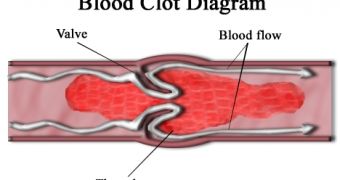A recent study, conducted by Joseph Emmerich, M.D., PhD, at the University Paris Descartes, showed that people who had been vaccinated against influenza exhibited 26 percent less chances of developing blood clots (venous thrombotic embolism – VTE), as opposed to the control group. All participants to the test were divided into two categories, all age- and gender-matched. Only healthy patients were accepted to be part of the control group, so that the results would turn out uninfluenced by other conditions.
"Infections in general increase blood viscosity, and systemic inflammatory reactions to infectious agents can themselves trigger a thrombotic process. However, influenza vaccination might lower the risk of thrombosis in other ways, as suggested by the even distribution of VTE events across the 12 months of the year in both vaccinated and unvaccinated cases in our study," explained Emmerich.
Another interesting discovery made by the French team was that patients under age 52 seemed to respond best to flu shots, while people past that age showed no conclusive improvements in their conditions. As a result, those below this age exhibited a 48 percent reduced chance of developing embolisms.
This disease can cause a lot of damage, if left untreated. Blood clots form inside vessels and slow down the blood flow, forcing it to go around the affected area. Eventually, the clots can become loose and travel with the blood to the heart, from where they can move to the lungs, causing pulmonary embolism. This condition is very dangerous, and, in many cases, can result in the death of the patient.
This discovery could be a "trigger" for the implementation of new medical regulations, concerning procedures that doctors should follow after diagnosing a patient with VTE for the first time. In such cases, flu vaccine could become standard procedure, especially if the sufferers are below 52 years of age. But, Emmerich cautions, and The American Heart Association agrees, patients suffering from heart problems should not take the nasal-spray form of the vaccine.

 14 DAY TRIAL //
14 DAY TRIAL //